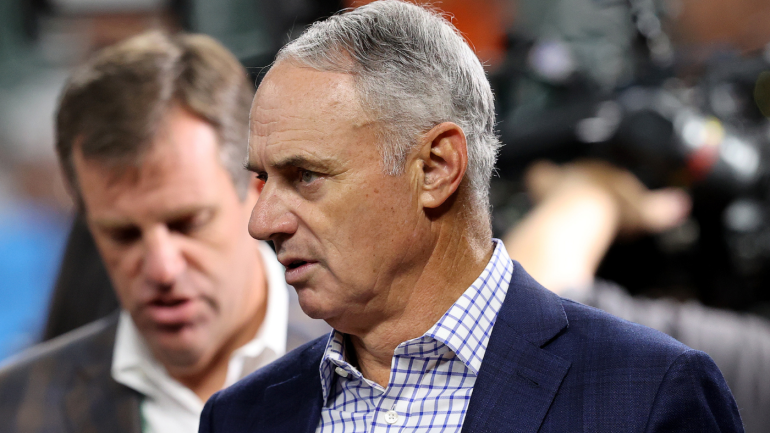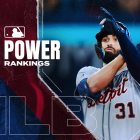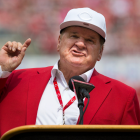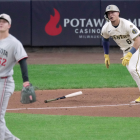
In announcing and advancing justifications for the owner lockout that presently afflicts baseball, MLB commissioner Rob Manfred indulged in two reliable blights upon modernity -- the open letter and rank dishonesty costumed as public-relations messaging.
The royal we speak of Manfred's recent missive titled "A letter to baseball fans," which attempts to blame the players and their union for the sport's first work stoppage in more than 25 years. Read the entire thing if the jurisdictional spirit moves you. In the event that it does not, we're here to highlight a few of Manfred's calculated inaccuracies. Let's take it excerpt by excerpt, shall we? We shall.
Manfred says:
"Despite the league's best efforts to make a deal with the Players Association, we were unable to extend our 26 year-long history of labor peace and come to an agreement with the MLBPA before the current CBA expired. Therefore, we have been forced to commence a lockout of Major League players, effective at 12:01am ET on December 2."
Let's focus on two parts of this particular slice of Manfred's letter: "Despite the league's best efforts to make a deal" and "forced to commence a lockout". Neither passes the smell test.
On the first one, by no reasonable standard have owners made their "best efforts" to forge a new CBA. For quite a long time -- years, really -- we've all known that the players' goal in these negotiations would be to get younger, pre-arbitration and/or pre-free agency players, on whom teams have become increasingly reliant, paid more in line with their on-field value. Right now, those players are underpaid to unseemly extremes. On a broader level, the union wants teams to be more competitive with one another. None of this is surprising, and those central concerns must at least be discussed if these negotiations are to be remotely fruitful. Owners, though, haven't been willing to engage on these points. Here's this bit of reporting from Evan Drellich of The Athletic:
"The owners would not agree to make a counter on reserve system and luxury-tax issues unless the MLBPA agreed in advance to drop a number of key demands, including the time it takes players to get to free agency and revenue sharing between owners, a person with knowledge of the union's position said. Such a precondition was something union leadership could not recall seeing before in bargaining, the person said, and the players did not agree to the request."
In the context of the CBA that will cover the 2022-2026 seasons, free agency and salary arbitration timelines are central matters, and refusing to discuss them undermines the entire exercise. This isn't to say owners must agree to the early proposals put forward by the union, but to say free agency and revenue sharing are off-limits (more on revenue sharing below) is not a serious tactic and puts the lie to any notion that owners have made anything like "best efforts."
Then there's the claim that owners were "forced" to undertake a lockout. They simply were not. Negotiations on a new CBA can proceed after the expiration of the old CBA, and indeed that's been the case at various points throughout the history of such things. Perhaps the reasons for undertaking the lockout are sound from the management perspective -- it eliminates the possibility of an in-season strike by players, which would in theory give the union greater leverage -- but it's hardly a necessity. Indeed, in the fairly long history of expired CBAs, this is the first time owners have locked out the players before the start of spring training.
On another level, the unstated reason for the lockout is very likely an effort to preserve the Competitive Balance Tax (CBT, or, more accurately, the "luxury tax"), as Joe Sheehan recently pointed out in his very excellent baseball newsletter. Please regard section XXIII of the recently expired CBA:
"There shall be no Competitive Balance Tax in place following the 2021 championship season, and the Parties expressly acknowledge and agree that the provisions of this Article XXIII (except those concerning the collection and distribution of the Competitive Balance Tax proceeds for the 2021 Contract Year and the assessment of any associated penalties for exceeding the Base Tax or Surcharge Thresholds) shall not survive the expiration of this Agreement."
Given that the CBT by design has come to function as a soft salary cap of sorts, MLB isn't about to let matters proceed without one. The lockout achieved just that -- not letting matters proceed without the CBT in place.
So, no, MLB has not made serious efforts at forging an accord with the players, and, no, the brinkmanship wasn't necessary.
Manfred says:
"This defensive lockout was necessary because the Players Association's vision for Major League Baseball would threaten the ability of most teams to be competitive."
This is a time-honored lie that dates back at least to the early years of Bud Selig's reign atop the sport. An effort on the part of owners to limit labor costs (i.e., player pay) is costumed as a measure to improve competitive balance. That's why the CBT is named that -- the Competitive Balance Tax -- as opposed to a more honest appellation.
In large measure, this part of Manfred's letter is likely a reference to the union's desire to alter the revenue-sharing system and apply incentives to the process. Thanks to revenue sharing, local and national television deals, real estate ventures surrounding their (probably publicly funded) ballparks, and now gambling revenues, teams are guaranteed profitability independent of gameday revenues like parking fees and ticket and concession sales. All that in the absence of any competitive pride, and you get teams that don't make a good-faith effort at fielding the best roster they can.
One way to attack this tangled problem is to condition revenue-sharing dollars upon more than just merely existing. The current reality is that a number of teams take in more via revenue sharing than they spend on payroll. That should never, ever happen, and the union is pressing for accountability on that front. Revenue-sharing recipients would be less likely to tank if those monies came with certain competitive responsibilities attached. In other words, the union is pressing to make bottom-feeding teams more competitive, not less.
Elsewhere in the letter, Manfred stresses that the owners have offered to institute a salary floor, which at first blush would seem to address these concerns. However, there's a reason that Manfred didn't include any specifics. According to multiple reports, the owners in August proposed a minimum $100 million payroll, but that salary floor would be funded by significantly lowering the CBT threshold to $180 million and significantly increasing overage penalties. This would've cost the players as a group millions upon millions of dollars when it comes to their total share of league revenues. The salary floor proposal that Manfred trumpets in his letter, in reality, amounts to, "Sure, you can have a payroll minimum as long as you pay for it yourselves." That's not a serious offer, which continues an ownership theme in these negotiations.
This is certainly not an exhaustive examination of the lies and inaccuracies in Manfred's letter, but the tidiest lockout rationales are addressed. Players are aware that the average career length is on the decline, that the average and median salary have stagnated, and that the minimum salary in MLB lags those in the NFL, NBA, and NHL. At the same time, teams are increasingly relying on those underpaid younger players while also on occasion manipulating their service time to delay arbitration and free agency. Given all those facts on the ground, it's entirely unsurprising that players would seek to correct those inequities. The owners know this, of course, but Manfred's is built upon hopes and assumptions that you don't.
![[object Object] Logo](https://sportshub.cbsistatic.com/i/2020/04/22/e9ceb731-8b3f-4c60-98fe-090ab66a2997/screen-shot-2020-04-22-at-11-04-56-am.png)

















